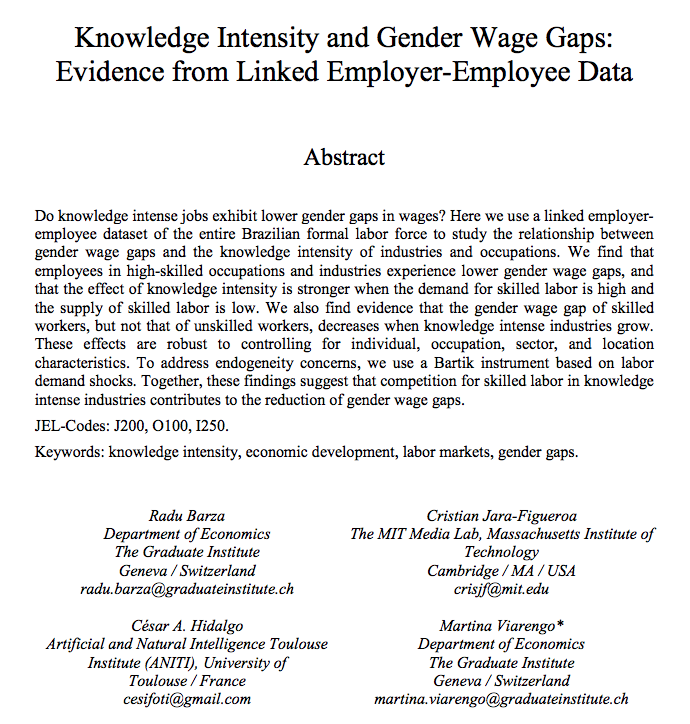In this new working paper we find evidence that gender differences in wages are lower for knowledge intense industries & occupations, and that this effect can be explained by competition for talent... let me explain (1/N)
#EconTwitter
https://www.cesifo.org/en/publikationen/2020/working-paper/knowledge-intensity-and-gender-wage-gaps-evidence-linked-employer">https://www.cesifo.org/en/publik...
#EconTwitter
https://www.cesifo.org/en/publikationen/2020/working-paper/knowledge-intensity-and-gender-wage-gaps-evidence-linked-employer">https://www.cesifo.org/en/publik...
We explore gender differences in wages using individual data matching employers & employees for Brazil& #39;s entire formal sector economy (~50 million people). This allows us to measure differences in wages between men & women while including nuanced controls (2/N)
We compared men & women with the same age, education, etc. working in the same location, industry, occupation, etc. As expected, wage gaps decrease with controls. About half of the gender wage gap is explained by sorting into sectors & occupations... (3/N)
But in this paper we wanted to go further, so we asked whether the unexplained gap (the one that cannot be accounted by our controls) was lower for more knowledge intense industries & occupations. We find it did, so then, we asked: Why? (4/N)
We hypothesized that gender equality increased with the knowledge intensity of an activity due to competition. In knowledge intense industries, firms must hire the best workers they can find, regardless of characteristics unrelated to productivity (eg gender) (5/N)
Firms in knowledge intense sectors that compensate skilled workers based on characteristics that are unrelated to productivity (e.g. gender) are more likely to exit the market. But do we find any evidence in support of this specific mechanism? (6/N)
Two observations tell us this may be the case. First, the effect is stronger in places with a limited supply for talent and rapidly growing knowledge intense sectors. That is, the effect is stronger were the need for talent is stronger. (7/N)
Second, we find the in high-skill occupations in knowledge intense industries, but not in low-skill occupations in knowledge intense industries. Hence, it seems to be the competition for talent, not a general characteristic of these industries, what drives the effect. (8/N)
What are the implications? On the one hand, it tells us that economic complexity or sophistication not only contributes to economic growth, but also, to better labor market outcomes (less gender inequity in this case). Yet, this is not a panacea. (9/N)
The effect is diminished when talent is abundant. So firms in places that are awash with talent are not under this pressure, and hence, may still find enough talent among groups of people defined by characteristics that are unrelated to their productivity (10/N)
Nevertheless, these findings add to the growing literature showing the social and economic relevance of economic complexity and sophistication. My thanks go to Radu Barza, @Cristian_jf, & Martina Viarengo for this amazing collaboration. (END_THREAD).

 Read on Twitter
Read on Twitter


